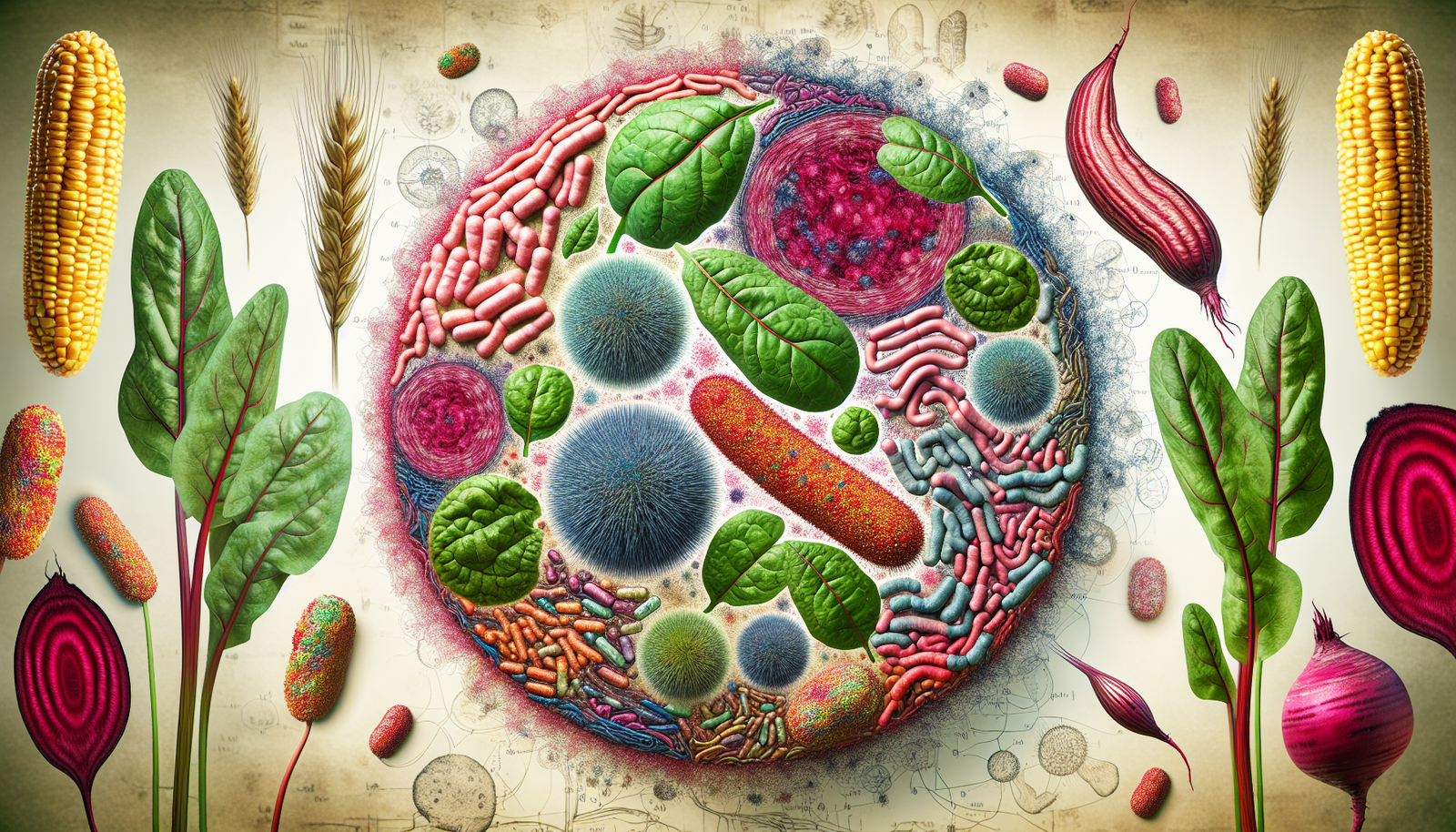Have you ever wondered how something as common as glyphosate could be impacting your gut health? It’s a question that might seem simple at first but leads us into a complex interplay between agriculture, microbiomes, and your overall well-being. Glyphosate, the herbicide found in many weed killers, is prevalent in the food supply. But what does it do to the food you eat and how does it interact with substances like oxalates in your body?
Understanding Glyphosate
To get to the heart of the matter, let’s break down what glyphosate is and why it’s so widely used. Glyphosate is a broad-spectrum systemic herbicide, meaning it targets a range of plants indiscriminately. Developed in the 1970s, it became the go-to herbicide for many farmers, largely due to its effectiveness and affordability.
Why Is Glyphosate Used?
Glyphosate is commonly used in agriculture to control weeds and boost crop yields. Many farmers grow glyphosate-resistant soybeans and corn, which allows them to apply the herbicide without damaging their main crops. It pretty much revolutionized farming practices but not without raising red flags regarding its long-term effects on health and the environment.
The Controversies Surrounding Glyphosate
Over the last decade, glyphosate has sparked significant conversation regarding its safety. Some studies suggest it may be linked to various health problems, including gastrointestinal disorders, certain cancers, and even disrupted gut microbiomes. The FDA and other health organizations have debated whether glyphosate is safe to consume in the low levels found in food products, leading to mixed opinions.
What Are Oxalates?
Before we jump into how glyphosate affects oxalates, it’s essential to understand what oxalates are. Oxalates are organic compounds found in many plants, particularly in green leafy vegetables, nuts, seeds, and some fruits.
Why Does Oxalate Matter?
Oxalates can be found in two forms: soluble and insoluble. While your body can handle small amounts of oxalates, excessive consumption can lead to health issues such as kidney stones and other mineral imbalances. This makes understanding oxalate breakdown and how it functions in your body crucial.
Your Gut Microbiome and Oxalate Breakdown
Your gut microbiome plays a key role in breaking down oxalates. Certain gut bacteria have the enzyme oxalate decarboxylase, which helps to degrade oxalates into less harmful substances, such as carbon dioxide and formate. When gut health is compromised, the ability to effectively break down oxalates diminishes.
How Glyphosate Interferes with Gut Bacteria
With the basics out of the way, the crux of the matter is how glyphosate might disrupt this delicate balance of your gut microorganisms. Glyphosate is known to be toxic to specific microbial populations.
Impact on Beneficial Gut Bacteria
-
Reduced Diversity: Glyphosate exposure has been shown to reduce the diversity of your gut microbiome. A less diverse microbiome can lead to an imbalance, making it harder for certain beneficial bacteria that assist in oxalate breakdown to thrive.
-
Killing Off Key Species: Some beneficial bacteria that help metabolize oxalates may be more susceptible to glyphosate exposure, resulting in reduced populations of these crucial microbes in your gut.
Potential Consequences for Oxalate Levels
When the gut microbiome is affected by glyphosate, several things may happen concerning oxalate breakdown:
| Issue | Consequence |
|---|---|
| Disruption of Microbial Balance | Inability to effectively metabolize oxalates |
| Decreased Levels of Beneficial Bacteria | Higher persistent oxalate levels in your system |
| Potential for Increased Oxalate Absorption | More risk of developing kidney stones or mineral deficiencies |
As the table illustrates, the relationship between glyphosate exposure and the effectiveness of oxalate breakdown turns problematic when disruptions occur.
Health Issues Linked to Excess Oxalates
When glyphosate interferes with your gut microbiome and compromises the breakdown of oxalates, what types of health issues could arise?
1. Kidney Stones
One of the most concerning impacts of elevated oxalate levels is the formation of kidney stones. Oxalates can combine with calcium in your urine to form crystals. When high oxalate levels persist, so does the risk of kidney stones, which can be both painful and debilitating.
2. Nutrient Absorption Issues
Excessive oxalate intake can also lead to impaired absorption of essential minerals such as calcium. This presents a double-edged sword: while you might think you’re getting enough calcium, oxalates might prevent your body from utilizing that calcium effectively.
3. Gut Health Complications
Compromised oxalate breakdown due to glyphosate could lead to broader gut health issues. You may experience bloating, cramps, or more severe gastrointestinal disorders. Also, if your microbiome remains out of balance, other flora can take over, creating conditions for dysbiosis, which can manifest as various symptoms.
Possible Remedies and Solutions
Now, you might be wondering what you can do to mitigate these impacts. Thankfully, there are several strategies to consider.
Eliminate Glyphosate Exposure
-
Choose Organic When Possible: Organic farming practices often prohibit glyphosate, so opting for organic produce can help minimize your exposure.
-
Grow Your Own: If you’ve got the space, growing your fruits and vegetables can ensure that you know exactly what treatments have been applied to your food.
Support Gut Health
-
Probiotics: Adding probiotics to your diet can help replenish good bacteria that may have been depleted due to glyphosate. Foods rich in probiotics include yogurt, kefir, and fermented vegetables.
-
Prebiotics: Foods high in fiber, such as whole grains, bananas, and legumes, can support the growth of beneficial bacteria in your gut.
Be Mindful of Oxalate Intake
-
Educate Yourself on Foods High in Oxalates: Most people will benefit from being aware of which foods are high in oxalates. High-oxalate foods include spinach, beets, and certain nuts. Moderation can help manage oxalate levels reasonably.
-
Balance Your Diet: Ensure that you’re getting a wide variety of foods in your diet so that your body has the nutrients it needs to tackle any excess oxalates.
Hydration is Key
Lastly, staying adequately hydrated can help flush out excess oxalates and reduce your risk of kidney stones. Make water your drink of choice, and aim for a minimum of 8 cups per day—more if you’re physically active.
What Do Studies Indicate?
Research is ongoing, and while many studies indicate a link between glyphosate and gut health issues, the specific mechanisms are still being unraveled. Most scientists agree that glyphosate’s broad effects can cause disruption in human health, but further research is necessary to clarify precise implications for oxalate metabolism.
Key Findings
-
Reduced Microbial Diversity: A study on glyphosate’s impact shows a notable decline in microbial diversity, which can severely impact processes like oxalate metabolism.
-
Potential Pathogen Proliferation: Some research suggests glyphosate allows for the proliferation of opportunistic pathogens in the gut, compounding the issues related to oxalate breakdown.
Final Thoughts
Understanding the connection between glyphosate, gut health, and oxalate metabolism is crucial for making informed decisions about your food choices and overall health. By being proactive in minimizing glyphosate exposure and caring for your gut microbiome, you’re proactively working towards better health outcomes.
Life can be busy, and food choices can streamline themselves into habits without much thought. By bringing awareness to what glyphosate is doing to your gut—specifically how it affects oxalate breakdown—you can reclaim your health journey, one informed decision at a time. Remember, it’s not just about what you eat, but also about how it interacts within your body. Keep the conversation going, and share what you know. Because knowledge is power, and your health deserves nothing less.




